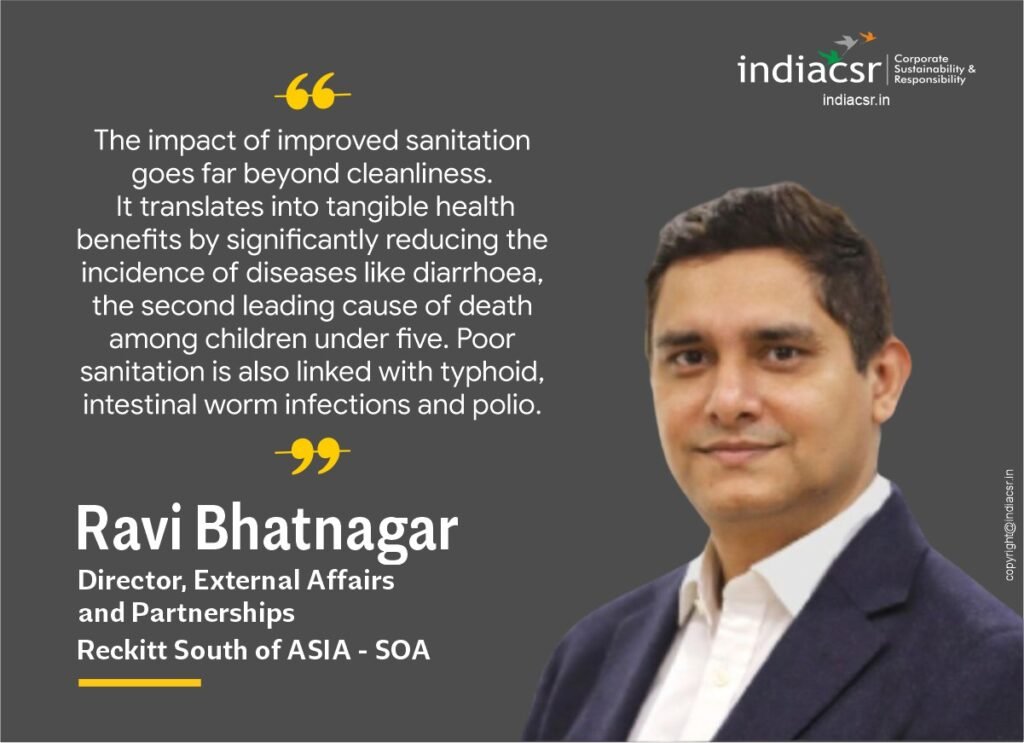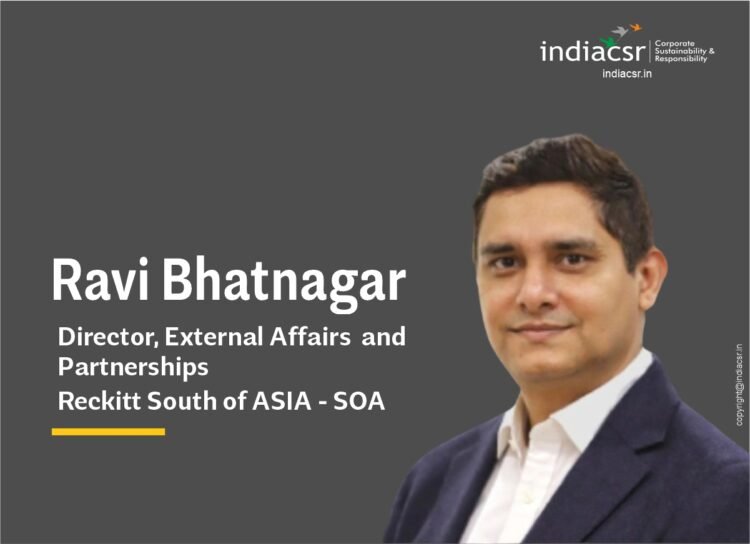Featuring Insights from Ravi Bhatnagar, Director, External Affairs & Partnerships, Reckitt South of Asia-SOA
NEW DELHI (India CSR): Outlook Group’s special edition (November 2023), spearheaded by Consulting Editor – Sustainability Rajiv Tikoo, delves into India’s critical sanitation issues, particularly the persistent challenge of manual scavenging. This comprehensive edition aims to uphold the principles of liberty, equality, and fraternity for every citizen, addressing the need for enhanced sanitation infrastructure and the dignified rehabilitation of sanitation workers. It offers a 360° view of the sanitation landscape, underscoring the importance of collaborative efforts between the government, civil society, and corporations.
The magazine has featured Ravi Bhatnagar, Director, External Affairs & Partnerships, Reckitt South of Asia-SOA as a Guest Editor and also covered an article by him. His thought-provoking article provides a more personalized and authoritative perspective on the Swachh Bharat Mission‘s achievements and ongoing challenges.
Sanitation for All and the Role of CSR
“Sanitation for All” in India represents a vital societal mission, aiming to improve public health and dignity through enhanced sanitation infrastructure. Corporate Social Responsibility (CSR) plays a crucial role, as businesses commit resources and expertise to support this nationwide endeavor, aiding in building sustainable communities and promoting inclusive development.
A Nation’s Drive Towards Cleanliness and Dignity
“Back in 2014, India embarked on a monumental journey – the Swachh Bharat Mission – with a goal to revolutionize its sanitation landscape,” states Ravi Bhatnagar. He reflects on the mission’s broad scope, targeting over six lakh villages and 25 crore households. “It was not just about building toilets but also transforming cultural practices and uplifting the lives of over five million sanitation workers, while putting an end to manual scavenging,” adds Bhatnagar.
‘Sanitation for All’ in India
The “Sanitation for All” initiative in India led by Govt. of India marks a significant stride towards public health and environmental stewardship. It aims to provide comprehensive access to improved sanitation facilities nationwide, focusing on constructing toilets, managing waste efficiently, and promoting hygiene, thereby fostering a cleaner and healthier living environment for all citizens.

Sweeping Success: A Testament to Collective Effort
As Bhatnagar observes, “Fast forward to today, and the results speak volumes: 11 crore toilets, 2.23 lakh community sanitary complexes, and 75% of villages achieving ODF-Plus status.” He emphasizes that this achievement underlines the power of political will and mass participation in achieving seemingly impossible goals.
Reckitt’s commitment to the Swachh Bharat Mission and SDGs focuses on behavioral change, education, and dignity for sanitation workers. The focus is on transforming sanitation workers’ lives, promoting safety, dignity, and well-being, and combating open defecation with impactful communication and community involvement.
A Holistic Approach: Beyond Numbers
“The Swachh Bharat Mission’s story is more than just numbers. It’s about resilience and belief in change,” explains Bhatnagar. He highlights the crucial role of partnerships, particularly with Reckitt and the Harpic World Toilet College (HWTC). “HWTC has trained over 100,000 sanitation workers, offering them alternatives to manual scavenging and contributing significantly to the mission’s success,” he proudly shares.

The Economic and Social Impact of Improved Sanitation
Ravi Bhatnagar elaborates on the broader benefits: “Improved sanitation is not just a health issue but a catalyst for economic and social development.” He talks about how it has reduced healthcare costs, increased productivity, and empowered women and girls. “It has also led to the recovery of resources, promoting a sustainable economy,” he adds.
Challenges and the Road Ahead
Despite the progress, Bhatnagar acknowledges that challenges remain. “Issues like faecal sludge management, manual scavenging, and cultural mindsets still need addressing,” he admits. Echoing his sentiments, Rajiv Tikoo, Consulting Editor at Outlook Group, emphasizes the need for a 360° approach, focusing on inspiration, skills, safety, innovation, and progress to eradicate manual scavenging completely.
The Magazine
The magazine, under the guidance of Guest Editor Ravi Bhatnagar, features a diverse team and a range of contributors who delve into various facets of sanitation and health. The editorial team, led by Suchetana Ray as Editor of Outlook Business, alongside Edition Editor Rajiv Tikoo and Executive Editor Nishant, is supported by a creative and photographic team, ensuring a high-quality publication.
Key contributions come from individuals like Gajendra Singh Shekhawat, who discusses India’s progress and future in sanitation; Dr. Nageshwar Reddy, linking gut health to sanitation; and Mark Balla, offering insights into India’s sanitation advancements under the Modi regime. Gaurav Jain redefines sanitation as an aspect of health, while S Damodaran focuses on menstrual challenges faced by women.
Dr. Indra Chakravarty highlights the collaborative efforts for holistic health, and Jack Sim provides a global perspective on India’s sanitation efforts. The importance of governance in sanitation is emphasized by Naina Lal Kidwai, and Akshay Rout discusses the role of stakeholders in sanitation’s next phase. Mahendra Mohan Gupta from the Jagran Group speaks about media responsibility in this context, and Hitesh Vaidya envisions an expanded definition of sanitation.
(India CSR)







